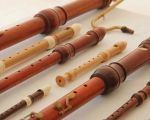
Why Is Tuning Your Violin So Important?
As a violinist, one of the first lessons I learned was how crucial it is to keep my instrument perfectly tuned. Whether you’re a beginner or a seasoned pro, playing a violin that's even slightly out of tune can drastically affect the sound, making it harder for you to play and for others to listen to. I vividly remember the first time I played in front of an audience and realized my violin was slightly off-pitch. The anxiety I felt was overwhelming, and the performance just didn’t feel right. That’s when I truly understood the importance of a good violin tuner.
php-templateThe Evolution of Violin Tuners
When I first started playing the violin, tuning was a manual process involving fine tuners and tuning pegs. But over time, technology has advanced, and now there are several types of violin tuners available to musicians of all levels. I’ve used quite a few of them throughout my journey, and some have worked better than others. The evolution of tuners has made it easier than ever to achieve perfect tuning in no time. Today, I’ll walk you through the best options available and how to choose the right one for your needs.
Types of Violin Tuners
Violin tuners come in several forms, each with its advantages and disadvantages. Understanding which type works best for you is key to getting the most out of your tuning experience.
Tuning Forks: The Classic Choice
Tuning forks are the oldest and most traditional method for tuning a violin. I personally started with a tuning fork when I was learning, as it helps develop your ear for pitch. The tuning fork produces a specific pitch when struck, and you match the sound of your violin strings to this pitch. While it's a great tool for ear training, it's not the easiest for beginners to use alone, especially during a performance when you need to tune quickly.
Clip-on Tuners: Compact and Convenient
Clip-on tuners have become incredibly popular in recent years, and for a good reason. These small devices attach directly to your violin’s headstock or scroll and provide real-time feedback on the pitch of your strings. I’ve used a clip-on tuner for years, and I love how fast and accurate they are. They work by sensing vibrations from the instrument, so they’re perfect for tuning in noisy environments, like orchestras or rehearsals. Some of the best clip-on tuners on the market today include the Snark SN-10S and the Korg AW-3.
Pedal Tuners: For Advanced Players
If you’re performing in a band or have a setup that requires consistent tuning throughout a performance, a pedal tuner might be the right choice for you. I’ve seen professional musicians use pedal tuners because they’re incredibly accurate and durable. You simply step on the pedal to activate the tuner, which works well for fast-paced live performances. Pedal tuners can be more expensive than other types, but they are worth the investment if you perform regularly.
Smartphone Tuner Apps: Modern Technology at Your Fingertips
Smartphone tuner apps have made tuning incredibly accessible, and I’ve found myself reaching for my phone more than once when I’ve forgotten my traditional tuner at home. There are several high-quality tuning apps available, such as Cleartune and iStrobosoft, which can turn your phone into a sophisticated tuning device. The convenience of having a tuner in your pocket is unmatched, especially for beginners who might not want to invest in a physical tuner right away.
How to Choose the Best Violin Tuner for You
Choosing the right tuner depends on several factors, including your level of experience, your needs, and your budget. Here’s what to consider:
1. Accuracy
When I first began exploring different tuners, accuracy was my top priority. You want a tuner that can give you a precise reading, so you’re not playing with incorrect pitch. Clip-on tuners and pedal tuners generally offer excellent accuracy, but I’ve also been surprised by how well some smartphone apps work, too.
2. Ease of Use
If you're new to violin playing, you’ll want a tuner that’s easy to use. Clip-on tuners are great for beginners because they’re quick to attach and easy to read. Smartphone apps, while very convenient, can sometimes be a little tricky to use if you’re unfamiliar with them. It’s all about finding something that’s comfortable for you.
3. Durability
Especially if you perform a lot, you’ll need a tuner that can stand up to the wear and tear of regular use. Pedal tuners and clip-on tuners are generally built to last, but you’ll want to check reviews for reliability before making a purchase.
4. Budget
Some tuners are more affordable than others, but higher price tags don’t always guarantee better performance. I recommend looking for a tuner that offers the best value for your specific needs. A simple clip-on tuner might be all you need if you’re just starting out, while more advanced players might prefer a strobe tuner or pedal tuner for more precise tuning.
My Personal Favorite Violin Tuners
Over the years, I’ve tested many different tuners, but a few have really stood out to me. Here are my top picks:
1. Snark SN-10S
The Snark SN-10S is a versatile clip-on tuner that works well for violins. It’s super easy to use, reliable, and accurate, which is why it’s one of my favorites. I also love the bright display, which makes it easy to read in any lighting.
2. Korg AW-3
The Korg AW-3 is another excellent clip-on tuner. It’s precise and durable, and it has a large, clear display that makes tuning on the go a breeze. The tuning range is great, and I’ve used it in various environments with excellent results.
3. Peterson StroboClip HD
If you’re looking for professional-grade accuracy, the Peterson StroboClip HD is a must-have. It’s a bit more expensive than the other options, but it offers unparalleled precision. I use it for more advanced performances, and it’s never let me down.
4. Cleartune App
As for smartphone apps, the Cleartune app is fantastic. It’s incredibly accurate, and it works well in noisy environments. If you don’t want to carry around a separate tuner, this app is a great solution.
Final Thoughts
Finding the best violin tuner really depends on your needs and preferences. Whether you’re a beginner or a professional, there’s a tuner out there that can help you achieve perfect tuning. I encourage you to try a few different options to see which one works best for you. Tuning your violin doesn’t have to be stressful – with the right tuner, it becomes a simple and rewarding part of your musical journey!








